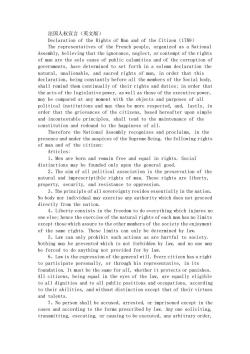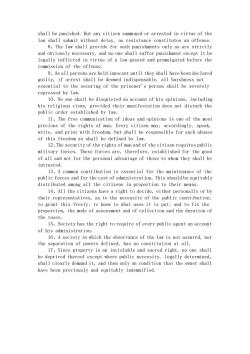《世界近代史》课程教学资源(文献资料)法国人权宣言 Declaration of the Rights of Man and of the Citizen

法国人权宣言(英文版) Declaration of the Rights of Man and of the Citizen (1789) The representatives of the French people,organized as a National Assembly,believing that the ignorance,neglect,or contempt of the rights of man are the sole cause of public calamities and of the corruption of governments,have determined to set forth in a solemn declaration the natural,unalienable,and sacred rights of man,in order that this declaration,being constantly before all the members of the Social body, shall remind them continually of their rights and duties;in order that the acts of the legislative power,as well as those of the executive power, may be compared at any moment with the objects and purposes of all political institutions and may thus be more respected,and,lastly,in order that the grievances of the citizens,based hereafter upon simple and incontestable principles,shall tend to the maintenance of the constitution and redound to the happiness of all. Therefore the National Assembly recognizes and proclaims,in the presence and under the auspices of the Supreme Being,the following rights of man and of the citizen: Articles: 1.Men are born and remain free and equal in rights.Social distinctions may be founded only upon the general good. 2.The aim of all political association is the preservation of the natural and imprescriptible rights of man.These rights are liberty, property,security,and resistance to oppression. 3.The principle of all sovereignty resides essentially in the nation No body nor individual may exercise any authority which does not proceed directly from the nation. 4.Liberty consists in the freedom to do everything which injures no one else;hence the exercise of the natural rights of each man has no limits except those which assure to the other members of the society the enjoyment of the same rights.These limits can only be determined by law. 5.Law can only prohibit such actions as are hurtful to society. Nothing may be prevented which is not forbidden by law,and no one may be forced to do anything not provided for by law. 6.Law is the expression of the general will.Every citizen has a right to participate personally,or through his representative,in its foundation.It must be the same for all,whether it protects or punishes. All citizens,being equal in the eyes of the law,are equally eligible to all dignities and to all public positions and occupations,according to their abilities,and without distinction except that of their virtues and talents 7.No person shall be accused,arrested,or imprisoned except in the cases and according to the forms prescribed by law.Any one soliciting, transmitting,executing,or causing to be executed,any arbitrary order
法国人权宣言(英文版) Declaration of the Rights of Man and of the Citizen(1789) The representatives of the French people, organized as a National Assembly, believing that the ignorance, neglect, or contempt of the rights of man are the sole cause of public calamities and of the corruption of governments, have determined to set forth in a solemn declaration the natural, unalienable, and sacred rights of man, in order that this declaration, being constantly before all the members of the Social body, shall remind them continually of their rights and duties; in order that the acts of the legislative power, as well as those of the executive power, may be compared at any moment with the objects and purposes of all political institutions and may thus be more respected, and, lastly, in order that the grievances of the citizens, based hereafter upon simple and incontestable principles, shall tend to the maintenance of the constitution and redound to the happiness of all. Therefore the National Assembly recognizes and proclaims, in the presence and under the auspices of the Supreme Being, the following rights of man and of the citizen: Articles: 1、Men are born and remain free and equal in rights. Social distinctions may be founded only upon the general good. 2、The aim of all political association is the preservation of the natural and imprescriptible rights of man. These rights are liberty, property, security, and resistance to oppression. 3、The principle of all sovereignty resides essentially in the nation. No body nor individual may exercise any authority which does not proceed directly from the nation. 4、Liberty consists in the freedom to do everything which injures no one else; hence the exercise of the natural rights of each man has no limits except those which assure to the other members of the society the enjoyment of the same rights. These limits can only be determined by law. 5、Law can only prohibit such actions as are hurtful to society. Nothing may be prevented which is not forbidden by law, and no one may be forced to do anything not provided for by law. 6、Law is the expression of the general will. Every citizen has a right to participate personally, or through his representative, in its foundation. It must be the same for all, whether it protects or punishes. All citizens, being equal in the eyes of the law, are equally eligible to all dignities and to all public positions and occupations, according to their abilities, and without distinction except that of their virtues and talents. 7、No person shall be accused, arrested, or imprisoned except in the cases and according to the forms prescribed by law. Any one soliciting, transmitting, executing, or causing to be executed, any arbitrary order

shall be punished.But any citizen summoned or arrested in virtue of the law shall submit without delay, as resistance constitutes an offense. 8.The law shall provide for such s only as are strictly and obviously necessary,and no one shall suffer punishment except it be legally inflicted in virtue of a law passed and promulgated before the commission of the offense. 9,As all persons are held innocent until they shall have been declared guilty, if rest shall be deemed indispensable, all har ess not essential to o the securing of the prisoner's person shall be severely repressed by law. 10,No one shall be disquieted on account of his opinions.including his religious views.provided their manifestation does not disturb the public order established by law. ll、The free comm nunication of ideas and opinions is one of the most precious of the rights of man.Every citizen may,accordingly,speak, write,and print with freedom,but shall be responsible for such abuses of this freedom as shall be defined by law. 12,The security of the rights of man and of the citizen requires public military ford hese force re,therefore established for the good of all and not for the personal advantage of those to whom they shall be intrusted. 13.A common contribution is essential for the maintenance of the public forces and for the cost of administration.This should be equitably distributed among all the citizens in proportion to their mea 14.All the citizens have a right to decide,eithe er personally or by their representatives,as to the necessity of the public contribution; to grant this freely;to know to what uses it is put;and to fix the proportion,the mode of assessment and of collection and the duration of the taxes. .Society has the right to require of every public agent an account of his administration. 16,a society in which the observance of the law is not assured.nor the separation of powers defined,has no constitution at all. 17.Since property is an inviolable and sacred right,no one shall be deprived the of av cept where public ne cessity,legally determined, shall clearly demand it,and then only on condition that the owner shal have been previously and equitably indemnified
shall be punished. But any citizen summoned or arrested in virtue of the law shall submit without delay, as resistance constitutes an offense. 8、The law shall provide for such punishments only as are strictly and obviously necessary, and no one shall suffer punishment except it be legally inflicted in virtue of a law passed and promulgated before the commission of the offense. 9、As all persons are held innocent until they shall have been declared guilty, if arrest shall be deemed indispensable, all harshness not essential to the securing of the prisoner's person shall be severely repressed by law. 10、No one shall be disquieted on account of his opinions, including his religious views, provided their manifestation does not disturb the public order established by law. 11、The free communication of ideas and opinions is one of the most precious of the rights of man. Every citizen may, accordingly, speak, write, and print with freedom, but shall be responsible for such abuses of this freedom as shall be defined by law. 12、The security of the rights of man and of the citizen requires public military forces. These forces are, therefore, established for the good of all and not for the personal advantage of those to whom they shall be intrusted. 13、A common contribution is essential for the maintenance of the public forces and for the cost of administration. This should be equitably distributed among all the citizens in proportion to their means. 14、All the citizens have a right to decide, either personally or by their representatives, as to the necessity of the public contribution; to grant this freely; to know to what uses it is put; and to fix the proportion, the mode of assessment and of collection and the duration of the taxes. 15、Society has the right to require of every public agent an account of his administration. 16、A society in which the observance of the law is not assured, nor the separation of powers defined, has no constitution at all. 17、Since property is an inviolable and sacred right, no one shall be deprived thereof except where public necessity, legally determined, shall clearly demand it, and then only on condition that the owner shall have been previously and equitably indemnified
按次数下载不扣除下载券;
注册用户24小时内重复下载只扣除一次;
顺序:VIP每日次数-->可用次数-->下载券;
- 《世界近代史》课程教学资源(文献资料)THE DECLARATION OF INDEPENDENCE.doc
- 石河子大学:《世界近代史》课程教学大纲 World Modern History.pdf
- 《中亚五国概况》课程教学课件(PPT讲稿)第02课 中亚概述(2/2).pptx
- 《中亚五国概况》课程教学课件(PPT讲稿)第15课 塔吉克斯坦的经济与文化.pptx
- 《中亚五国概况》课程教学课件(PPT讲稿)第14课 塔吉克斯坦政体.pptx
- 《中亚五国概况》课程教学课件(PPT讲稿)第12课 吉尔吉斯斯坦政治与经济.pptx
- 《中亚五国概况》课程教学课件(PPT讲稿)第04课 哈萨克斯坦政治制度.pptx
- 《中亚五国概况》课程教学课件(PPT讲稿)第17课 土库曼斯坦(2/2).pptx
- 《中亚五国概况》课程教学课件(PPT讲稿)第16课 土库曼斯坦(1/2).pptx
- 《中亚五国概况》课程教学课件(PPT讲稿)第13课 塔吉克斯坦概况.pptx
- 《中亚五国概况》课程教学课件(PPT讲稿)第10课 乌兹别克斯坦科教卫体及文化.pptx
- 《中亚五国概况》课程教学课件(PPT讲稿)第09课 乌兹别克斯坦的经济.pptx
- 《中亚五国概况》课程教学课件(PPT讲稿)第08课 乌兹别克斯坦的政治制度.pptx
- 《中亚五国概况》课程教学课件(PPT讲稿)第07课 乌兹别克斯坦共和国概况.pptx
- 《中亚五国概况》课程教学课件(PPT讲稿)第06课 哈萨克斯坦科教卫化事业.pptx
- 《中亚五国概况》课程教学课件(PPT讲稿)第05课 哈萨克斯坦经济.pptx
- 《中亚五国概况》课程教学课件(PPT讲稿)第11课 吉尔吉斯斯坦国土、人民、简史.pptx
- 《中亚五国概况》课程教学课件(PPT讲稿)第03课 哈萨克斯坦共和国.pptx
- 《中亚五国概况》课程教学课件(PPT讲稿)第01课 中亚概述(1/2).pptx
- 《正道沧桑——社会主义500年》书籍电子版(PDF电子书,共50集).doc
- 《世界近代史》课程教学资源(文献资料)常识 COMMON SENSE.doc
- 《世界近代史》课程教学资源(文献资料)解放宣言 Emancipation Proclamatio.doc
- 《世界近代史》课程教学资源(文献资料)The Magna Carta 大宪章.doc
- 《世界近代史》课程教学资源(试卷习题)试卷1试题.doc
- 《世界近代史》课程教学资源(试卷习题)试卷2试题.doc
- 《世界近代史》课程教学资源(试卷习题)试卷4试题.doc
- 《世界近代史》课程教学资源(试卷习题)试卷3试题.doc
- 《世界近代史》课程教学资源(试卷习题)试卷1答案.doc
- 《世界近代史》课程教学资源(试卷习题)试卷2答案.doc
- 《世界近代史》课程教学资源(试卷习题)试卷3答案.doc
- 《世界近代史》课程教学资源(试卷习题)试卷4答案.doc
- 《世界近代史》课程教学资源(书籍文献)后现代主义与史学研究(黄进兴.扫描版).pdf
- 《世界近代史》课程教学资源(书籍文献)世界通史——近代卷(下).pdf
- 《世界近代史》课程教学资源(书籍文献)世界通史——近代卷(上).pdf
- 《世界近代史》课程教学资源(书籍文献)世界史——近代史编(上卷).pdf
- 《世界近代史》课程教学资源(书籍文献)世界史——近代史编(下卷).pdf
- 《世界近代史》课程教学资源(书籍文献)历史是什么〔英〕爱德华·霍列特·卡尔.pdf
- 《世界近代史》课程教学课件(PPT讲稿)俄国1861年改革.ppt
- 《世界近代史》课程教学课件(PPT讲稿)德国——民族国家的统一之路.ppt
- 《世界近代史》课程教学课件(PPT讲稿)法国大革命.ppt
